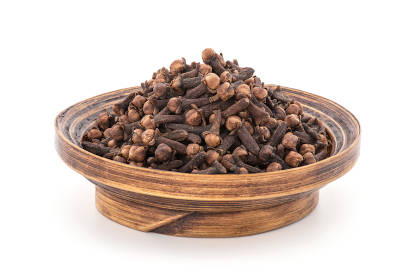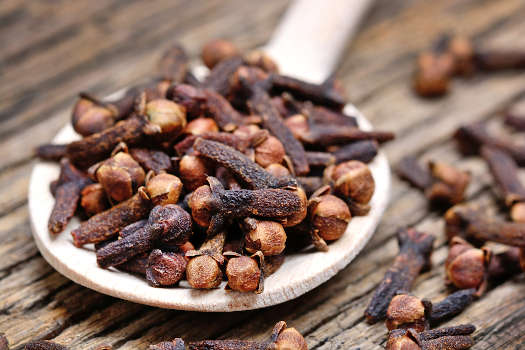There’s no mistaking cloves (Syzygium aromaticum) in the spice aisle. Nothing else looks quite like these distinctive woody brown buds.
Sometimes, you might even smell them before you see them — their warm, spicy scent is hard to miss. While they’re no longer worth their weight in gold as they were at the height of the spice trade, cloves are still highly valued by practitioners of witchcraft.
Magical Properties of Cloves
These spicy buds are potent magical catalysts. Like many hot herbs, they provide a punch of power and speed. However, unlike some other hot herbs, cloves aren’t usually used for banishing or baneful magic.
Magically, these buds attract luck, prosperity, love, and friendship. Infuse them in wine or cider, and they make an aphrodisiac. Placed in sachets and shared among friends, they keep friendships strong.
Cloves are also protective, and eating them is said to increase courage.
In some traditions, cloves are used as commanding herbs. They may be included in spells where it’s necessary to assert your will. This makes them helpful for stopping gossip or slander about you — press cloves into a red candle, and burn it to stop malicious gossip in its tracks.
Cloves are ruled by Jupiter and the element of fire.
See also: Check out whole and grounded Cloves here, and Clove essential oils here.
Benefits & Uses
Cloves are rich in a compound called eugenol, which is extremely helpful for tooth pain. You can even experience this if you chew on a dried clove — you’ll feel the numbness quickly.
Cloves are also anti-inflammatory, antioxidant, and antibacterial.
Studies examining cloves and digestive health have found that they may help thicken the mucous lining of the stomach, which can help protect against ulcers.

Cloves also help reduce signs of fatty liver disease and cirrhosis. It’s also a carminative, meaning that it helps reduce gas, bloating, and flatulence.
Clove extract may be helpful for healing anal fissures. Preliminary research found that applying it for six weeks was more effective than conventional treatment.
When used topically, clove oil may help reduce excessive sweating.
Possible Risks & Side Effects
It’s possible to be allergic to cloves. This can appear as a rash, itching of the throat, lips, or tongue, or anaphylactic shock. If you’re allergic to cloves, use another herb in their place.
Cloves are considered safe when they’re used in the amounts you’d use to flavor food. When used in larger amounts, they may not be safe for all individuals.
Eugenol extract and clove essential oil are very concentrated. They may cause topical burns. If you use them for toothache pain, be careful not to get the oil anywhere but on the affected tooth. If you use clove oil anywhere else, be sure to dilute it well with an appropriate carrier oil.
Cloves are often added to cigarettes or used as incense. Directly inhaling the smoke from cloves is considered unsafe. Side effects include breathing problems and lung damage. If you choose to burn cloves, do so in a well-ventilated area.
Clove oil is not safe for children. If it’s taken orally, or rubbed on the teeth or gums and accidentally swallowed, it can cause seizures and liver damage.
People with clotting disorders, or who are taking anticoagulants like Warfarin, shouldn’t use cloves. They can slow blood clotting.
Similarly, people with diabetes should be aware that cloves may lower blood sugar. Talk to your doctor before using clove medicinally, since your medications may need to be adjusted and your bloodwork carefully monitored.
History & Folklore
Cloves are the dried buds of an Indonesian tree. It was customary for people to plant them to commemorate the births of their children.
The first written references to cloves come from Chinese literature from the Han dynasty (202 BCE to 220 CE). They were traded by China and Rome, and were one of the most sought-after spices for European traders.

Dutch spice traders, greedy for a monopoly on clove trading, destroyed any clove trees they found growing outside of the areas they controlled — considering the local custom of planting trees to commemorate babies, this made them many enemies.
By the 1800s, the French created a smuggling operation to sneak clove saplings out of Indonesia. Eventually, other countries established groves of clove trees outside of Dutch control. Cloves now grow in parts of South America, Asia, and Africa.
Getting Started With Clove
Cloves require tropical conditions to grow, and a thriving tree can reach 26-40 feet at maturity and take six years to flower. For this reason, they aren’t a great herb for most green witches to try to grow on their own.
Getting started with clove is pretty easy. As a popular spice, they’re readily available at virtually any supermarket as either whole or ground buds.
You can also easily find clove oil in health food stores. An easy first magical formula using cloves simply involves including them in herbal mixtures for love, luck, or prosperity.
Cloves are also an ideal ingredient for a protection jar. Use a small, clean jar with a lid — like a jar for marmalade or baby food. Add a petition paper with your intent written on it.
Next, add protective herbs. Cloves, frankincense, rue, rosemary, and pine needles are useful here. When you’ve added each herb, close the jar and give it a good shake. Hold it in both hands, and visualize it filling and pulsing with energy.
Screw the lid on tightly, and seal the jar with red and black candle wax. When the jar is complete, bury it in your yard. If you don’t have a yard, bury it in the soil of a potted plant, or hide it somewhere safe in your home.
Cloves have always been an herb of power and positivity. Long before they became a magical staple for witchcraft, they were associated with the joy of a new birth. No matter how you choose to use these buds, they will add their powerful kick to your spells.
As an Amazon Associate, Terravara earns from qualifying purchases at no additional cost to readers.
